Session 1 of 3
Al-Zaytouna Centre for Studies and Consultations held on 12/1/2021 the first session of the panel discussion, “The Palestine Issue: Strategic Evaluation 2020 – Strategic Assessment 2021.”
Participants included a group of researchers, scholars, specialists and those interested in the Palestine issue, who discussed the internal Palestinian scene, the internal Israeli scene, the peace process and the Arab landscape affecting the Palestine issue.
The panel discussion was moderated by Prof. Dr. Mohsen Mohammad Saleh, and the main panelists included Sari ‘Orabi, Hani al-Masri, Dr. Muhannad Mustafa, and Ashraf Bader.
Sari ‘Orabi discussed the developments of the Palestinian Reconciliation in 2020 and its possible prospects for 2021. He said that Hamas had agreed to a non-synchronized elections not because of Biden’s win in the US presidential election, rather because of its endeavor to overcome the obstacles to national unity. However, ‘Orabi said that considering elections as the only way to end the division is not new, and that even if the elections were held, this would not mean the end of schism. For there is a disagreement between Fatah and Hamas over their view of the Palestinian political system, where Hamas does not recognize the bases on which the PA was established, which is primarily having a security role. The essence of the dispute is the disagreement between two programs; a program based on achieving Palestinian rights through a peaceful settlement with the occupation, which has failed over the past years, and a program based on resisting the occupation by all means, especially through armed resistance. ‘Orabi saw that ‘Abbas is concerned with legislative elections to renew the PA’s legitimacy and the peace process, whereas he is not interested in the elections of the Palestinian National Council (PNC) and the rebuilding of the Palestine Liberation Organization (PLO). He said that he’s afraid that if the elections were held, they will either lead to the recycling of the Palestinian division or drag Hamas into the political realm of Fatah. ‘Orabi concluded that the reconciliation and the elections remain governed by many considerations, whether by the power centers in the Fatah movement or the stances of international, Israeli and Arab parties.
The second panelist was Hani al-Masri, who discussed the peace process and the Israeli annexation plans in 2020. He believed that although the “Deal of the Century” reflects the Zionist approach to the conflict, the Israeli right rejects any deal that sets borders for any Palestinian state. He expected that during Biden’s term the core of the deal would remain, for Biden supports Zionism, hence, he will not exert pressure on the Israeli side during his term; particularly since there are much more important priorities for the US president than the Palestine issue. Therefore, al-Masri warned, the Palestinian side must pay attention to this point and rely on itself in its national struggle. Al-Masri was astonished by the series of concessions that the PA leadership began to make in the wake of Biden’s victory, especially concerning the prisoners and the security coordination, for he considered these concessions would not restore the relationship with US to its previous state, nor will they open the doors of US aid without requests in return. Al-Masri believed that the way Hamas has recently managed the conflict with Israel and its adaptation to international and regional changes would not stop targeting it, and the same applies to Fatah and the PA. He considered the solution lies in putting the Palestinian house in order on the basis of Palestinian interests, and in ending the division on national bases, and that the PA must change by adopting a national work plan rather than being itself dissolved. At the end, al-Masri asserted that the main stake must be on the people, the steadfastness, and the resistance, and that there are no free elections under the occupation.
The third panelist was Dr. Muhannad Mustafa, who discussed the developments of the Israeli internal scene in 2020 and its possible prospects for 2021. He saw that the Israeli political system in 2020, has become captive to the right-wing bloc, which consists of the conservative right and the religious nationalist right wings. The former is represented in the Blue and White party, while the latter in the dominant right-wing bloc headed by the Likud Party. In the next elections, there will be competition within the religious nationalist movement. Mustafa pointed out that, during the past two years, Israel, governance wise, has become one of the most unstable political systems, as there are elections and a change of government every two years and three months. The right-wing bloc controlling the government is in fragments, there are intra-party fissures and inter-party mobility of political leaders, in addition, some parties are dissolved while others are established, especially within the right-wing nationalist movement. Despite all that, the Likud is still the dominant party in Israeli politics, where opinion polls indicate the possibility of it winning 28 seats in the upcoming elections. Muhannad believes that the current Oslo Accords have strengthened the Israeli right, and at the end he asked about the way to make this reality contradict the Zionist project.
The fourth panelist was Ashraf Bader who discussed the developments of the Arab countries surrounding Israel and the Palestine issue, and the possible prospects for 2021. He considered that the crises of the Arab countries have reflected negatively on the Palestine issue, and that the Arab reaction to the “Deal of the Century” did not fulfill the aspirations regarding the Palestine issue. He emphasized that the recent Arab normalization with Israel had a negative impact and have increased the pressure on the Palestinian side. Furthermore, Israel has benefited from the decline of Arab and Islamic support, the division of the Arab countries and the conflicts and wars in some of them, to increase the marginalization of the Palestine issue.
There were many rich and important interventions including those of Basil Khalaf, Amin Hoteit, ‘Abdul Hamid bin Salem, Jawad al-Hamad, Ziad Ibheis, Maryam Abu Daqqa, Wa’el Najm, Ayman Zaidan, ‘Adnan Abu Amer, Zuhair Hawari, Ahmad Nabulsi and Husam Shweiki.
At the end, Saleh thanked the participants for their contribution, stressing that the topic and ideas discussed in the panel were vital and useful, hoping that these ideas will contribute to serving the Palestine issue and everybody working for it.
He added that we are crossing a historical milestone, as the region is being reconfigured. Therefore we need to be very aware and responsible. We need to rebuild a true Palestinian national project in order to face the upcoming challenges.
Al-Zaytouna Centre for Studies and Consultations, 13/1/2021
Session 2 of 3
Al-Zaytouna Centre for Studies and Consultations held on 19/1/2021 the second session of the panel discussion, “The Palestine Issue: Strategic Evaluation 2020 – Strategic Assessment 2021.”
Participants included a group of researchers, scholars, specialists and those interested in the Palestine issue, who discussed the developments witnessed by the Arab, Israeli, Muslim and international landscapes, and discussed the most prominent projections for 2021.
The panel discussion was moderated by ‘Atef al-Joulani, and the main panelists included Prof. Dr. Ahmad Sa‘id Nufal, Prof. Dr. Talal ‘Atrissi, Dr. Ibrahim Fraihat and Dr. Sa‘id al-Haj.
Prof. Dr. Ahmad Sa‘id Nufal discussed the developments of the normalization with Israel in 2020 and its possible prospects for 2021. He said that the normalization of some Arab countries with Israel, according to their point of view, was for “their own interests,” but at the expense of the Palestine issue. However, he added, that time will prove that this step was not in the interest of these countries, because Israel does not only threaten the Palestinian people and the neighboring countries, but also threatens all Arab and Muslim countries.
Nufal added that the Arab countries have no right to recognize Israel at the expense of the Palestinian people, and questioned the future of normalization. For Israel is a racist entity that cannot integrate into Arab societies. The Arab peoples will reject normalization, they were not asked nor were their opinion taken by these normalizing governments, because these governments know that the people will not accept normalization at any cost. Nufal refused to believe that the Arab states that embraced the occupation did so in the interest of the Palestinian people, or that appeasement and peace settlements without returning Palestinian and Arab rights will yield results. He stressed that what was taken by force cannot be restored except by force.
The second panelist was Prof. Dr. Talal ‘Atrissi, who discussed Iran and the Palestine issue: Developments and Possible Prospects. He said that the most prominent thing that happened in 2020 was the Gulf-Israeli normalization agreement, and that it was a very dangerous matter. The danger lies in the notion of forming new alliances in the region that are based on the claim that the Palestine issue is no longer an important Arab issue, rather, the focus now must turn towards the threat coming from Iran. They claim that Israel is no longer an enemy. He said that it is unfortunate to say that this normalization was free of charge. ‘Atrissi considered the danger is in trying to mislead the peoples of the region by saying that this step was in the interest of the Palestine issue, not at its expense. This normalization is a gift to the US President Donald Trump, and with his blessing. ‘Atrissi warned that this normalization will have serious consequences, not only for Iran, but also for everyone in the region who resists the Israel. Security cooperation will be a priority for Israel, and that’s a threat to Iran’s national security; since Israel has technically become a regional neighbor to Iran through its relations and coordination with the United Arab Emirates and Bahrain. However, he added, Iran will comprehensively review the way it deals with these two countries, as the calculations are different this time. ‘Atrissi expected that the Resistance Axis parties will develop their cooperation and coordination in the coming stage, because the counterparties will work in a coordinated and thoughtful manner to achieve their plan. He called for the formation of the “Resistance to Normalization” axis, by having various parties and organizations in the Arab and Muslim world cooperate to confront this capitulation and normalization project.
The third panelist was Dr. Ibrahim Fraihat, who discussed the international, particularly US, influence on the Palestine issue and the possible prospects for 2021. He expected that the foreign policy of the US President-elect Joe Biden will oscillate between “the ghost of President Trump and the spirit of President Obama,” especially with regard to the Palestine issue. He said that although the Democratic and Republican parties have different approaches towards the Palestine issue lately, this change was not reflected in the new Biden administration. For example, Antony Blinken, a conservative Democrat who adopts the traditional line in favor of Israel, has been appointed Secretary of State. Fraihat expected that that Biden would preserve much, but not all, of what his predecessor Trump has done. For example, he will not move the US embassy from Jerusalem to Tel Aviv, but he will stop Trump’s starvation policy against the Palestinians, by returning the US aid to UNRWA, some aid to the Palestinian Authority (PA), and the financial aid paid to independent projects, such as some hospitals in Jerusalem and elsewhere. Biden will not endorse the major settlement building projects, as Trump has did, however, he will only oppose them through diplomatic statements and stances. Biden will not lead the normalization plans between the Arab countries and Israel, or impose them, but he will support them. He stressed that regardless what happens to the peace process, the US financial and military support for Israel will continue. He said that we must not have high expectations of what would the Biden administration do to the Palestine issue, and that Palestinians should have a plan to influence Biden’s policy. As for the EU, Fraihat ruled out Europe’s abandonment of its support for the Oslo Accords, whatever the circumstances are.
The fourth panelist was Dr. Sa‘id al-Haj who discussed the developments of Turkey and the Palestine issue, and the possible prospects for 2021. He considered that the Turkish position on the Palestine issue in 2020 has remained the same; supporting the two-state solution, supporting the Arab peace initiative, and cooperating with various Palestinian parties; The PA, Hamas and other factions. Despite the possibility of a rapprochement between Israel and Turkey during the Biden term, it is more probable that the political relationship will continue to be minimal and not return to its previous state. Al-Haj explained that Turkey’s position on the Palestine issue is usually formulated according to two considerations: First, the internal Turkish scene, the strength and influence of the Justice and Development Party, and its ability to introduce certain new variables to Turkey’s traditional policy. Second, the developments of the Palestine issue itself; If there were any Israeli aggression or new political developments, for example: severing ties in 2010 between Ankara and Tel Aviv, after the Israeli attack on the Mavi Marmara ship. Al-Haj also referred to the change in Turkish behavior towards the Palestinian reconciliation, when in September 2020, it hosted the Palestinian parties to discuss reconciliation. Al-Haj addressed the Turkish politics transformation after Joe Biden’s win and its willingness to communicate with Israel. He saw that Turkey’s political calculations concerning Biden’s administration’s (Especially with regard to imposing US economic sanctions on Ankara due to the Russian-made S-400 system and other issues) was the reason for the change in Turkey’s foreign policy including its relations with Israel.
There were many rich and important interventions including those of Ziad Bheis, Amin Hoteit, Usamah Hamdan, Fawaz al-Sousi, Mahmud al-‘Ailah, Majid al-Zibdeh, ‘Abdullah al-‘Akkad, Sari Hanafi, ‘Awwad al-Mahdawi, and ‘Ali Howeidi.
Al-Zaytouna Centre for Studies and Consultations, 20/1/2021
Session 3 of 3
Al-Zaytouna Centre for Studies and Consultations held on 2/2/2021 the third session of the panel discussion, “The Palestine Issue: Strategic Evaluation 2020 – Strategic Assessment 2021.”
Participants included a group of researchers, scholars, specialists and those interested in the Palestine issue, who discussed the developments witnessed in Jerusalem, the changes undergone by the Palestinian resistance and the changes that affected the structure and capabilities of the Israeli army, the right of the Palestinians abroad to participate in the Palestinian decision-making, and the economic situation in Gaza Strip and the West Bank. They also discussed the most prominent projections for 2021.
The panel discussion was moderated by Dr. Raid Nairat, the head of the Political Science Department at An-Najah National University, and the main panelists included Ziad Bheis, a researcher specialized in Jerusalem; Mo‘in al-Taher, author and researcher; Hisham Abu Mahfuz, deputy secretary-general of the Popular Conference for Palestinians Abroad; and Prof. Dr. Moein Ragab, senior economic analyst.
Prof. Dr. Mohsen Mohammad Saleh opened the session, while Nairat expressed his condolences on the demise of the Palestinian political activist and academic ‘Abdul Sattar Qassem, who was a professor of political science and Palestinian studies at An-Najah National University.
The first panelist was Ziad Bheis, whose paper was entitled, “Jerusalem: Developments and Possible Prospects.” Bheis referred to three historically progressive contexts of the conflict in Jerusalem: The historical shift in the nature of the struggle with Zionism, the shift of the ruling elite from secular nationalism to right-wing religious nationalism, and when the US adopted the Israeli position concerning the identity of Jerusalem during Trump’s term. Bheis discussed the most prominent events during 2020, such as the Great Fajr Campaign at al-Aqsa mosque, the COVID-19 pandemic and its impact on the masses, and singling out the Orthodox popular movement, especially with the decline in the number of Christians in Jerusalem. He also discussed the issues of demolition, demography and settlement building in the West Bank, especially in Jerusalem.
As for 2021, Bheis expects that Israel would attempt to take advantage of the pandemic to limit the popular will to the maximum, the Judaization of Jerusalem will lose the international interest, while internally this interest will remain during the Israeli election and beyond. However, he expects that during 2021, the Palestinian popular interest in Jerusalem and support will regain their momentum.
The second panelist was Mo‘in al-Taher, whose paper was entitled, “The Palestinian Resistance: Developments and Possible Prospects. He discussed the changes undergone by the Palestinian resistance, and the changes that affected the structure and capabilities of the Israeli army, and how these have changed fighting methods, trying to pinpoint its strengths and weaknesses. Al-Taher expected that the way of combat of the Elite units would be developed so as to hit distant targets without getting involved in a long war, and that UAVs would be more involved in the assassinations of Iranian figures. He tried to identify the features of a comprehensive resistance, not just a military one, where the Palestinian people would participate wherever they are, supported by the Arab Ummah (nation) and pro-Palestine activists. He also tried to define the ways and means to achieve the resistance objectives.
As for the third panelist Hisham Abu Mahfuz, his paper was entitled, “Palestinians Abroad and Putting the Palestinian Political House in Order: Developments and Possible Prospects.” He discussed the importance of the role of Palestinians abroad, which include mobilizing their resources to serve the Palestine issue, adding that their marginalization contributed to the deterioration and imbalance of the Palestinian political house. Abu Mahfuz stressed that Palestinians abroad have the right to return, to participate in the Palestinian decision-making and be represented in Palestinian institutions. Then, he talked about the role of the Popular Conference for Palestinians Abroad, the Palestinians of Europe and the Palestinians of South America and their endeavor to activate the role of the Palestinians abroad in the Palestinian national project. He added that the current phase offers the Palestinian people and their leadership a historic opportunity to achieve Palestinian unity and ensure the representation of all Palestinians. This would be achieved by rebuilding the Palestine Liberation Organization (PLO) and holding elections for the Palestinian National Council, hence a broadly representative Palestinian leadership—that confronts Israel and preserve Palestinian fundamentals—would be produced.
The fourth panelist was Prof. Dr. Moein Ragab, whose strategic assessment of 2020 included discussing a number of indicators that increased the suffering of the Palestinians during that year. These include the economic hardship especially during the COVID-19 pandemic, the decline in productive activities, the government fiscal deficit, high unemployment rates, the continuation of the trade balance deficit, the decline in trade volume, the decline of the investment markets and public and private consumption indicators, and the decline of external support funds. All of these have happened while the government lacks any strategy or vision for the future, the occupation controls all aspects of Palestinian life—and taking harsh economic measures such as deductions from Palestinian clearance funds, and while the Gaza Strip residents suffer due to the Palestinian schism and the economic blockade.
Concerning the projections for 2021, Ragab mentioned that this year carries a very difficult and cruel economic legacy. The best-case scenario is if it remains as it was before the pandemic, adding that the unemployment rates will remain at high levels. Even if there were growth in foreign trade, exports and imports and a recovery in the markets, these developments would be of limited impact, and remain within the limits of a return to pre-pandemic conditions.
There were many rich and important interventions, and the discussions were open and objective. At the end. the panelists answered the participants’ inquiries and questions.



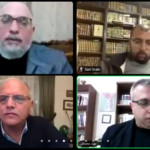
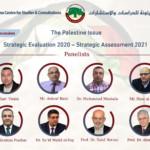
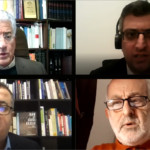
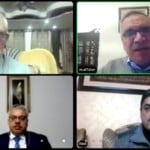
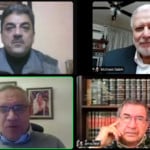
Leave A Comment